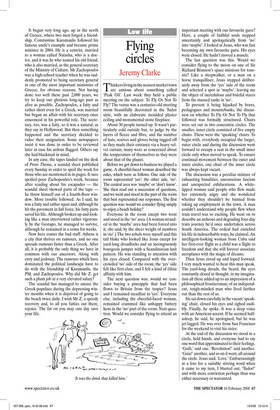Flying circles
Jeremy Clarke
Thinkers living in the nearest market town are anxious about something called ‘Peak Oil’. Last week they held a public meeting on the subject: To Fly Or Not To Fly? The venue was a centuries-old meeting room beautifully decorated in the Tudor style, with an elaborate moulded plaster ceiling and monumental stone fireplace.
About 30 people turned up. It wasn’t particularly cold outside but, to judge by the layers of fleece and fibre, and the number of hats, scarves and gloves being tugged off as they made their entrance via a heavy velvet curtain, many were as concerned about the temperature of themselves as they were about that of the planet.
Before we got down to business we played a game. A cheerful-faced woman described the rules, which were as follows. One side of the room represented ‘yes’; the other side, ‘no’. The central area was ‘maybe’ or ‘don’t know’. She then read out a succession of questions, and we went and stood in the part of the room that best represented our responses. The first question was: would we consider flying simply to enjoy a beach holiday?
Everyone in the room except two went and stood in the ‘no’ area. (A woman stranded in the ‘maybe’ area had been forced into it, she said, by the sheer weight of numbers in ‘no’.) The two rebels were myself and this tall bloke who looked like Jesus except for yard-long dreadlocks and an incongruously bourgeois jumper with a Scandinavian knit pattern. He was standing to attention with his eyes closed. Compared with the overcrowded ‘no’ side of the room, the ‘yes’ side felt like first-class, and I felt a kind of élitist affinity with him.
The next question was: would we consider buying a pineapple that had been flown to Britain from the tropics? Jesus and I remained steadfast in ‘yes’. Everyone else, including the cheerful-faced woman, remained crammed like unhappy battery hens in the ‘no’ part of the room. Next question. Would we consider flying to attend an important meeting with our favourite guru? Here, a couple of faithful souls stepped uncertainly and apologetically from ‘no’ into ‘maybe’. I looked at Jesus, who was fast becoming my own favourite guru. His eyes were closed. He hadn’t moved a muscle.
The last question was this. Would we consider flying to the moon on one of Sir Richard Branson’s space missions for tourists? Like a sleepwalker, or a man on a horse tranquilliser, Jesus stepped deliberately away from the ‘yes’ side of the room and selected a spot in ‘maybe’, leaving me the object of incredulous and baleful stares from the massed ranks in ‘no’.
To prevent it being hijacked by bores, pedagogues and mountebanks, the discussion on whether To Fly Or Not To Fly that followed was formally structured. Chairs were set out in two concentric circles. The smaller, inner circle consisted of five empty chairs. These were the ‘speaking’ chairs. To begin with, everybody occupied the larger, outer circle and during the discussion went forward to occupy a seat in the small inner circle only when moved to speak. To ensure continual movement between the outer and inner circles, one chair of the inner circle was always kept vacant.
The discussion was a peculiar mixture of exhausting banalities, unconscious fascism and unexpected exhilarations. A whitelipped woman said people who flew made her extremely angry and she wondered whether they shouldn’t be banned from taking up employment in the town. A man couldn’t understand why people flew when train travel was so exciting. He went on to describe an arduous and degrading four-day train journey he’d once undertaken across South America. The ordeal had enriched his life in indescribable ways, he claimed. An intelligent-looking woman from Cuba said her first-ever flight as a child was a flight to freedom and that she will forever associate aeroplanes with the magic of dreams.
Then Jesus stood up and loped forward. I very much wanted to hear this man speak. The yard-long dreads, the beard, the eyes constantly closed in thought: in my imagination all these added up to an impression of a philosophical frontiersman; of an independent, tough-minded man who lived further out than the rest of us.
He sat down carefully in the vacant ‘speaking’ chair, closed his eyes and sighed audibly. Finally, he spoke. It was a deep voice with an American accent. If he seemed halfasleep, he said, he apologised, but he was jet-lagged. He was over from San Francisco for the weekend to visit his sister.
At the end of the discussion we stood in a circle, held hands, and everyone had to say one word that approximated to their feelings. ‘Guilt,’ said one. ‘Revolution!’ said another. ‘Gaia!’ another, and so on it went, all around the circle. Jesus said, ‘Love.’ Embarrassingly at a loss for a suitable stirring word when it came to my turn, I blurted out, ‘Tudor!’ and with more conviction perhaps than was either necessary or warranted.


















































































 Previous page
Previous page